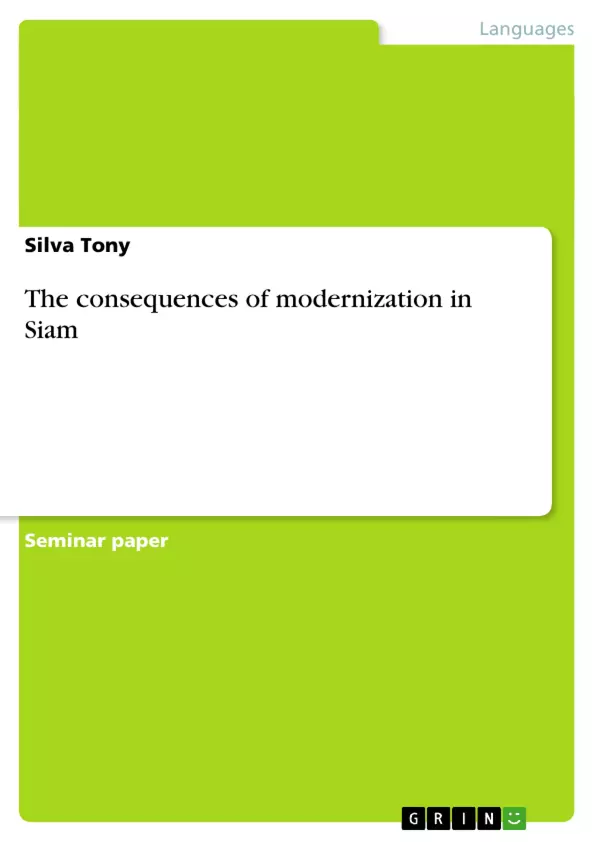The world is currently plagued with inequality and exploitation. Several movements have been established across the globe to preach peace, social justice and ecological sustainability. We often come across inspiring stories of individuals or groups utilizing their ingenuity in ensuring social justice and environmental protection. Sivaraksa in his book Conflict, Culture, Change: Engaged Buddhism in a Globalizing World notes that modernization is the root source of cultural erosion amongst the people of Siam. According to Sivaraksa, modernization has come with lack of respect for nature, social justice and equality (Sivaraksa 107).
Sivaraksa fends for the survival of his tradition – Buddhism. In essence, Sivaraksa is not entirely opposed to modernization; rather, he observes that the modernization process can also borrow from the sustainable traditional approaches. He is keen to select from and rebuild Buddhism in a quest for the traditional roots of his religion. Sivaraksa identifies the complex and ambiguous nature of modernity, and asserts the need to embrace the spirit of Buddhism in its traditional form (43).
Sivaraksa relates the modern history of Siam to that of Thai during the Western Imperialism. Even though King Mongkut employed several diplomatic efforts to defend Thai from foreign dominance, the Westren imperialists developed new reforms that saw a change in the culture, administrative structure, educational system and even the military structure. As a result of the elite’s leadership, Siam grew so fast to become more like a Western center. During King Rama’s reign, western culture dominated the lifestyles of the Siam people. As Sivaraksa notes, “life in the countryside was negatively impacted” (109)...
Table of Contents
- Introduction
- The Consequences of Modernization in Siam
- Sivaraksa's Response to the Challenges of Modernization
- Conclusion
Objectives and Key Themes
This text examines the effects of modernization on Thai society, specifically focusing on the challenges posed by Western imperialism and capitalism to traditional Buddhist values. It argues for a return to Buddhist principles of peace, social justice, and environmental sustainability as a way to address the problems of the modern world.
- The impact of Western modernization on Thai culture and society
- The erosion of traditional Buddhist values in the face of capitalism and consumerism
- The importance of spiritual development and compassion in overcoming the evils of greed, hatred, and delusion
- The need for social justice and equality in a globalized world
- The significance of respecting nature and traditional ways of life for achieving peace and happiness
Chapter Summaries
The introduction presents the main argument of the text, which is that modernization has led to social injustice and environmental degradation, and that a return to traditional Buddhist values is necessary to address these problems. The text uses Siam as an example of a society that has been negatively impacted by modernization.
The second chapter explores the consequences of modernization in Siam. It examines the impact of Western influence on Thai culture, including the erosion of traditional Buddhist values, the rise of consumerism, and the exploitation of natural resources.
The third chapter discusses Sivaraksa's response to the challenges of modernization. It emphasizes the importance of spiritual development, social justice, and environmental respect as key to addressing the problems of capitalism and consumerism.
Keywords
The main keywords and focus topics of this text include: modernization, Western imperialism, capitalism, consumerism, Buddhism, Siam, social justice, environmental sustainability, peace, equality, greed, hatred, delusion, traditional values, spiritual development, and compassion.
Frequently Asked Questions
What is the main cause of cultural erosion in Siam according to Sivaraksa?
Modernization, driven by Western imperialism and capitalism, is identified as the root source of cultural erosion and social injustice in Siam (Thailand).
Is Sivaraksa entirely opposed to modernization?
No, he is not entirely opposed but argues that the modernization process should incorporate sustainable traditional and Buddhist approaches.
What are the consequences of Western influence on Thai society?
Consequences include the rise of consumerism, lack of respect for nature, and a shift in administrative and educational structures that negatively impacted rural life.
How does Buddhism offer a solution to modern challenges?
Buddhism emphasizes compassion and spiritual development to overcome greed, hatred, and delusion, promoting social justice and environmental peace.
What historical period does the text reference?
The text relates the modern history of Siam to the era of Western Imperialism, specifically during the reigns of King Mongkut and King Rama.
- Citar trabajo
- Silva Tony (Autor), 2013, The consequences of modernization in Siam, Múnich, GRIN Verlag, https://www.grin.com/document/271566



